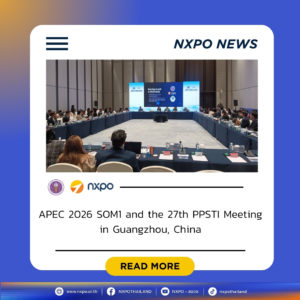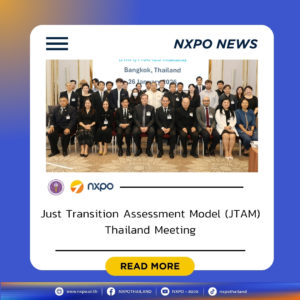NXPO participated in the 127th Session of the Committee for Scientific and Technological Policy (CSTP), organized by the Organisation for Economic Co-operation and Development (OECD). The session was held in two parts — an online session on 16 October 2025 and an in-person session at the OECD Headquarters in Paris from 27–29 October 2025.

Representing Thailand, the NXPO delegation comprised Dr. Pranpreya Sriwannawit Lundberg, Director of International Policy Partnership Division, and Senior Policy Specialists Ms. Vipaporn Asavapisit and Mr. Parinand Varnasavang.

During the online session, Dr. Pranpreya contributed to the discussion on key science, technology, and innovation (STI) policy priorities of member countries for the next 2–4 years. She stated that Thailand aims to transform its real sector into an innovation-driven system within the next few years. To achieve this, comprehensive institutional reform is essential to strengthen the linkages between STI policy and the country’s economic and industrial restructuring, enabling STI to serve as a mechanism for inclusive and sustainable development. Preparations are now underway for the reform of Thailand’s science, research, and innovation system to better respond to increasingly complex challenges. Furthermore, Thailand expressed strong interest in collaborating with the OECD and CSTP members, particularly in areas related to the digital and green transitions.

Key agenda items at the in-person meeting included the presentation of the OECD Science, Technology and Innovation (STI) Outlook 2025, discussions on the Programme of Work and Budget (PWB) 2027, and country-specific support under the OECD Agenda for Transformative STI Policies. The OECD Secretariat also reported progress on the project “Supporting Science, Technology, and Innovation Strategy for Carbon Neutrality and Transitions” in Thailand. Dr. Pranpreya conveyed Thailand’s gratitude to the OECD Secretariat and all project partners, emphasizing that this collaboration has been instrumental in guiding the country’s efforts to harness STI as a driving force in the transition toward carbon neutrality and net-zero greenhouse gas emissions. Thailand has recently advanced its net zero target from 2065 to 2050 to align with the global ambition under the Paris Agreement, reflecting growing confidence in STI as an essential enabler of this transformation.

Dr. Pranpreya also highlighted the OECD’s policy recommendations under the project, reaffirming Thailand’s intention to tailor these recommendations to the national context in order to accelerate the country’s net-zero pathway and ensure a just and sustainable transition. She emphasized that continued collaboration among ministries and relevant agencies will be vital to achieving this goal. Dr. Pranpreya further underscored the value of shared learning, noting that as a pilot country under the OECD Agenda for Transformative STI Policies, Thailand is pleased to share its experiences and promote mutual learning among nations. She reaffirmed Thailand’s commitment to working closely with the OECD and member countries to translate policy into action — advancing STI and international cooperation toward a sustainable, carbon-neutral future that leaves no one behind.

Thailand’s active participation in CSTP meetings and activities not only facilitates the exchange of policy insights and best practices for building innovation ecosystems and strengthening global STI cooperation, but also supports Thailand’s on-going OECD accession process.







